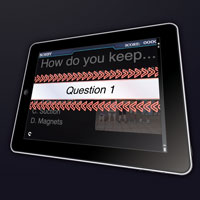| Feb 25, 2015 | |
NIBIB launches Want to Be a Bioengineer? game app |
|
| (Nanowerk News) How do you keep an artificial limb attached to the body? What lab-grown organ have scientists successfully transplanted into patients? You can find the answer to these questions and many more while playing Want to Be a Bioengineer? a game for middle and high school students, designed by the National Institute of Biomedical Imaging and Bioengineering (NIBIB), part of the National Institutes of Health. | |
 The game introduces students to real-life examples of how bioengineers are improving people’s lives, from helping paralyzed individuals stand, to re-growing fingertips, to finding new ways to see inside the body. During the game, students answer a series of multiple choice questions pertaining to subjects in rehabilitation engineering, regenerative medicine, and biomedical imaging. At the end, a score is generated based on how many questions are answered correctly. “It is truly an exciting time to be entering the field of bioengineering. Yet, students don’t often know what it means to be a bioengineer,” said NIBIB Director Roderic Pettigrew, Ph.D., M.D. “The bioengineers we support are building bioartifical kidneys, growing functional cartilage, and developing implantable sensors that can detect real-time changes in biochemistry. They are coming up with ways to make tumors glow, supercool organs so that they can stay outside the body longer for transplantation, and store vaccines so they don’t require refrigeration. They are making biomedical technologies better, faster, cheaper, and smaller and, in doing so, are profoundly changing health care in the U.S. and around the world.” |
|
| “This game is a fun and easy way to introduce a younger generation to the exciting possibilities of bioengineering. It plants the seed that if you’re interested in science and technology, enjoy being creative, and have a desire to help people, you might consider becoming a bioengineer,” said Pettigrew. | |
| The game can be played on the NIBIB website at http://www.nibib.nih.gov/science-education or downloaded for free to your phone or tablet from the iTunes App store. |
| Source: National Institute of Biomedical Imaging and Bioengineering |
